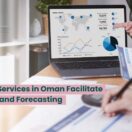In the dynamic world of accounting, AI and automation are no longer mere buzzwords but catalysts for monumental change. As technology progresses at an unprecedented rate, accounting services in Oman and worldwide are witnessing a paradigm shift. Artificial Intelligence (AI) and automation technologies are ushering in an era where routine tasks are executed with precision, efficiency, and speed previously unimagined. Gone are the days when accountants were buried under heaps of paperwork, meticulously reconciling numbers and manually entering data. Today, intelligent systems handle these tasks, allowing accountants to pivot towards more strategic roles.
With its ability to analyse vast datasets, AI identifies patterns and anomalies that would take a human eye significantly longer to detect. Automation streamlines repetitive processes, reducing the likelihood of human error and enhancing the accuracy of financial records. The integration of these technologies is revolutionising how accounting services in Oman operate, fostering an environment where time-consuming tasks are automated, freeing professionals to focus on value-added activities.
Transformative Benefits for Accounting Services
The transformative impact of AI and automation on accounting services cannot be overstated. One of the most significant advantages is the enhancement of efficiency. Automated systems can process transactions and reconcile accounts in a fraction of the time it takes manually. This speed increases productivity and allows for real-time financial monitoring, providing businesses with up-to-date financial insights essential for making informed decisions.
Additionally, AI-powered analytics offer deep insights into financial data, enabling accountants to provide strategic advice and predictive analysis. This shift from transactional to advisory roles empowers accountants in Oman to become trusted business advisors, guiding clients through complex financial landscapes with greater confidence and accuracy. Moreover, the scalability of automated systems means that as businesses grow, their accounting processes can seamlessly expand without the need for proportional increases in the workforce.
Another critical benefit is enhanced compliance and accuracy. Automated systems ensure that accounting practices adhere strictly to regulatory requirements, significantly reducing the risk of non-compliance penalties. By leveraging AI to scrutinise transactions for irregularities, accounting services in Oman can maintain high standards of accuracy and integrity, bolstering client trust and satisfaction.
Challenges and Ethical Considerations
Despite the myriad benefits, integrating AI and automation in accounting brings several challenges and ethical considerations. One of the primary concerns is data security. With vast amounts of sensitive financial information being processed and stored digitally, the risk of cyber-attacks and data breaches becomes a pressing issue. Accounting services in Oman must invest in robust cybersecurity measures to protect client data and maintain confidentiality.
Additionally, the shift towards automation raises questions about job displacement. As machines take over routine tasks, the demand for traditional accounting roles may diminish, leading to potential job losses. The industry must address this concern by investing in upskilling and reskilling programs, ensuring that accounting professionals can adapt to the evolving landscape and take on more strategic, analytical roles.
Ethical considerations also come into play with the use of AI. Decision-making processes powered by AI must be transparent and free from biases. Ensuring that AI systems are designed and monitored to make ethical decisions is crucial in maintaining the trust and integrity of accounting services. Moreover, as AI becomes more integrated into accounting processes, the need for clear guidelines and regulatory frameworks to govern its use becomes increasingly important.
Preparing for an Automated Future in Accounting
As AI and automation transform the accounting landscape, professionals and businesses must prepare for this future. These technologies require a mindset shift and a willingness to invest in new tools and training. For accounting services in Oman, staying ahead of the curve means adopting the latest technologies and fostering a culture of continuous learning and innovation.
Educational institutions and professional organisations play a pivotal role in this transition. Updating curricula to include AI and automation can equip future accountants with the skills needed to thrive in an increasingly automated environment. Continuous education and training programs focused on these emerging technologies will be essential for current professionals.
Moreover, collaboration between technology providers and accounting firms can drive innovation and ensure that solutions are tailored to meet the industry’s specific needs. By working together, they can develop tools that enhance efficiency and support the ethical and secure use of AI and automation in accounting.
In conclusion, the advent of AI and automation is profoundly reshaping the accounting industry. While challenges and ethical considerations must be addressed, the benefits of these technologies are undeniable. Accounting services in Oman stand to gain significantly from embracing AI and automation, positioning themselves at the forefront of a future where strategic advisory roles and enhanced efficiency define the profession. By preparing today, they can ensure a seamless transition into the automated future of accounting.











